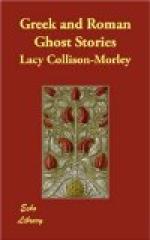There is nothing more characteristic of paganism than the passionate longing of the average man to perpetuate his memory after death in the world round which all his hopes and aspirations clung. Cicero uses it as an argument for immortality.[8]
Many men left large sums to found colleges to celebrate their memories and feast at their tombs on stated occasions.[9] Lucian laughs at this custom when he represents the soul of the ordinary man in the next world as a mere bodiless shade that vanishes at a touch like smoke. It subsists on the libations and offerings it receives from the living, and those who have no friends or relatives on earth are starving and famished.[10] Violators of tombs were threatened with the curse of dying the last of their race—a curse which Macaulay, with his intense family affection, considered the most awful that could be devised by man; and the fact that the tombs were built by the high road, so that the dead might be cheered by the greeting of the passer-by, lends an additional touch of sadness to a walk among the crumbling ruins that line the Latin or the Appian Way outside Rome to-day.
No one of the moderns has caught the pagan feeling towards death better than Giosue Carducci, a true spiritual descendant of the great Romans of old, if ever there was one. He tells how, one glorious June day, he was sitting in school, listening to the priest outraging the verb “amo,” when his eyes wandered to the window and lighted on a cherry-tree, red with fruit, and then strayed away to the hills and the sky and the distant curve of the sea-shore. All Nature was teeming with life, and he felt an answering thrill, when suddenly, as if from the very fountains of being within him, there welled up a consciousness of death, and with it the formless nothing, and a vision of himself lying cold, motionless, dumb in the black earth, while above him the birds sang, the trees rustled in the wind, the rivers ran on in their course, and the living revelled in the warm sun, bathed in its divine light. This first vision of death often haunted him in later years;[11] and one realizes that such must often have been the feelings of the Romans, and still more often of the Greeks, for the joy of the Greek in life was far greater than that of the Roman. Peace was the only boon that death could bring to a pagan, and “Pax tecum aeterna” is among the commonest of the inscriptions. The life beyond the grave was at best an unreal and joyless copy of an earthly existence, and Achilles told Odysseus that he would rather be the serf of a poor man upon earth than Achilles among the shades.




